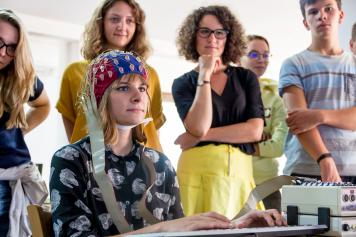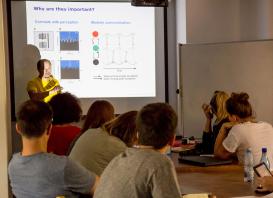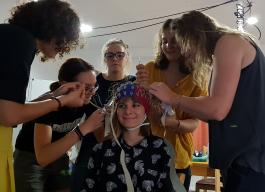INTERLEARN Workshop at Amsterdam
5 - 8 June, 2019
This was a four-day Workshop in which INTERELEARN ESRs and supervisors, as well as other CBCD PhD students benefited from talks on topics including network models in Psychology and Bayesian and frequentists statistics, and from practical sessions using r and JASP. It was organized and run by INTERLEARN supervisor Dr Han van de Maars and ESR Susanne De Moiij.
INTERLEARN MRI Physics Workshop
29th November, 2018
This was a day-long series of lectures by Dr. Joerg Magerkurth on the physics behind Magnetic Resonance Imaging (MRI). The workshop was open to the School of Science at Birkbeck.
INTERLEARN Science Dissemination and Communication Workshop
28th November, 2018
This was a day-long series of talks from speakers with different career backgrounds, including Drs. Nicola Davis, John Hogan, Björn Christiansen, Frank Wiesemann and Clare Elwell. ESRs benefited from listening to the experience of the speakers on dissemination and communication of research, and advise on how to do this clearly and effectively. The workshop was open to the School of Science at Birkbeck.
INTERLEARN Neuroimaging Workshop
6-11 September, 2018
This was a 5 day course, organised by Dr. Raul Muresan and held in Pike Lake, Romania. The ESRs were given talks and lectures on techniques to measure brain activity, including EEG, MEG and fMRI. They participated in lab sessions, where they took part in the recording and analysis of EEG data, using Biosemi ActiveTwo system and Matlab. They also delivered group projects that they subsequently presented to one another.



UCL-BBK NIRS Training Course
16 - 18 May, 2018
This was a 2.5 day course, organised and run by Drs. Rob Cooper, Sarah Lloyd-Fox, and Anna Blasi, sponsored by Gowerlabs Ltd. (www.gowerlabs.co.uk), and open to the CBCD. The coursed aimed to provide an introduction to all aspects of NIRS research, including theoretical considerations and experimental challenges to data analysis. The course was structured as a series of lectures with examples to provide illustrations of the topics discussed, as well as practical, hands-on sessions to provide attendees the opportunity to practice what was discussed. The course was closed with a guest lecture by Daniel Leff.
INTERLEARN Workshop at P&G
24 - 26 April, 2018
This was a workshop focused on the INTERLEARN ESRs, opened to all CBCD PhD students, and took place at Procter & Gamble German Innovation Center. Supervisor, Frank Wiesemann noted: “The participants were very impressed by the capabilities, the interesting work and the professional presentations and demonstrations [showcased by the presenters]. And they enjoyed and appreciated the 'look behind the scenes' and the open and transparent discussions and answers to their questions.”
Symposium in Honour of Annette Karmiloff-Smith
27 - 28 March, 2018
This symposium, in honour of the late Annette Karmiloff-Smith, included two days of talks from an international group of speakers. The symposium was open to all.
INTERLEARN Scientific Bootcamp
18 - 29 September, 2017
Recordings of talks, suggested reading, and slides
This was an intensive two-week interdisciplinary and integrated training course that directly followed from the start-of-project meeting. Open to others in London, it was designed to provide all ESRs with a firm grounding in the basic skills and knowledge needed for cutting-edge research in developmental cognitive neuroscience. The ‘boot camp’ concentrated a great deal of training into the beginning phase of the ESRs’ projects. This will give ESRs a major advantage in advancing their research, and also will minimise potential conflicts between the need for a comprehensive, multi-methodology training programme and the EID requirement that ESRs split their 36-month PhD equally between the academic and non-academic partners. It will also serve to encourage closer scientific and social links between ESRs at the beginning of their training period, which should further develop over the course of their PhDs.
